On SaveTheInternet.com they give this are their main point:
Net Neutrality is the Internet’s guiding principle: It preserves our right to communicate freely online. This is the definition of an open Internet.
Net Neutrality means an Internet that enables and protects free speech. It means that Internet service providers should provide us with open networks — and should not block or discriminate against any applications or content that ride over those networks. Just as your phone company shouldn’t decide who you can call and what you say on that call, your ISP shouldn’t be concerned with the content you view or post online.
Without Net Neutrality, cable and phone companies could carve the Internet into fast and slow lanes. An ISP could slow down its competitors’ content or block political opinions it disagreed with. ISPs could charge extra fees to the few content companies that could afford to pay for preferential treatment — relegating everyone else to a slower tier of service. This would destroy the open Internet.
The ACLU also puts in their 2 cents:
The Internet has become so much a part of the lives of most Americans that it is easy to imagine that it will always remain the free and open medium it is now. We’d like to believe it will remain a place where you can always access any lawful content you want, and where the folks delivering that content can’t play favorites because they disagree with the message being delivered or want to charge more money for faster delivery.But there are no such guarantees.If the government doesn’t act soon, this open internet — and the “network neutrality” principles that sustain it — could be a thing of the past. Profits and corporate disfavor of controversial viewpoints or competing services could change both what you can see on the Internet and the quality of your connection. And the need to monitor what you do online in order to play favorites means even more consumer privacy invasions piled on top of the NSA’s prying eyes.
More than any other invention of our time, the Internet has unlocked possibilities we could just barely imagine a generation ago. And here’s a big reason we’ve seen such incredible growth and innovation: Most Internet providers have treated Internet traffic equally. That’s a principle known as “net neutrality” — and it says that an entrepreneur’s fledgling company should have the same chance to succeed as established corporations, and that access to a high school student’s blog shouldn’t be unfairly slowed down to make way for advertisers with more money.
While I have no problem with net neutrality as a principle or concept, I have serious concerns about Net Neutrality as legislation or public policy.
The Courts will rule the Internet…All bits are bits, all bits are equal.
He then expands upon this on The Blaze:
…the Internet isn’t perfect, but slowing down or reversing its progress by giving the government control is not the answer.
